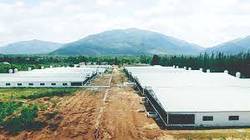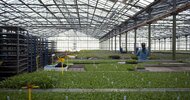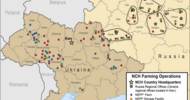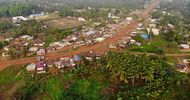Sentient Media | 29 March 2022
By Jennifer Mishler
A massive pig breeding and farming operation in Vietnam is set to expand, aided by $26 million in funding recently granted by the International Finance Corporation (IFC). The investment comes despite fierce opposition from animal and environmental protection organizations–and amid urgent calls for development banks to divest from factory farms.
In Vietnam, the call for factory farm divestment grows louder
By Jennifer Mishler
A massive pig breeding and farming operation in Vietnam is set to expand, aided by $26 million in funding recently granted by the International Finance Corporation (IFC). The investment comes despite fierce opposition from animal and environmental protection organizations–and amid urgent calls for development banks to divest from factory farms.
In January, a group of advocacy organizations including Brighter Green, Compassion in World Farming, World Animal Protection, and others wrote a joint letter to IFC, detailing the reasons the organizations stood in opposition to the then-proposed funding of Mavin Group Joint Stock Company (Mavin Group). The groups touched on a number of issues ranging from the treatment of animals to public health and deforestation, expressing concern that despite all of these red flags, IFC “continues to fund industrial livestock projects.” They called for IFC to “stop funding industrial production and to instead support sustainable forms of animal farming.” They are among a growing chorus of voices urging the financial sector to divest from factory farms.
A 2020 investigation found that IFC was one of two major development banks that had funneled a total of $2.6 billion into meat and dairy industries in just ten years, prompting researchers to warn that funding industrial animal agriculture could put global climate goals at risk. A Feedback report published in July 2020 took a wider look at the financing of animal agriculture, showing that $478 billion had been given to meat and dairy companies by more than 2,500 investment banks, firms, and pension funds around the globe from 2015 to 2020. By comparison, just $59 billion in backing was received by alternative protein producers over the same period, according to the Good Food Institute.
Despite this pushback, IFC approved its investment on February 8, although it did not grant the farm the full $52 million in funding it had initially considered. The move bolsters an already soaring pork industry in Vietnam. According to the U.S. Department of Agriculture, Vietnam is the sixth-largest pork producer in the world and, behind China, the second-largest in Asia. Both consumption and production of pork and poultry in Southeast Asia are expected to continue growing over the next ten years. Brighter Green has reported on the growth of industrial dairy production in Vietnam as well, which the organization attributes in part to westernization.
In its disclosure, IFC, a World Bank Group member that refers to itself as “the largest global development institution focused on the private sector in developing countries,” calls Mavin Group a “vertically integrated pork producer, meat processer, feed mill operator, and veterinary health products manufacturer.” Vertical integration means that the company controls all or multiple aspects of its production and supply chain. Mavin Feed’s five Vietnam mills produce over 1.2 million tons of animal feed each year, and Mavin Farm is described as “one of the top five swine producers,” owning a herd of about 3,250 sows throughout its five pig breeding facilities.
Unprecedented growth
IFC’s funding is intended to support Mavin’s goal of increasing its number of breeding farms and increasing its number of breeding pigs by 7,500 animals. IFC discloses that “the increase in breeding stock shall result in a threefold increase” in contracted farms from 36 to approximately 150, housing a total of around 900,000 pigs by the year 2025.
The opposing groups believe that despite a claim from the IFC, there is “little evidence” offered that Mavin animal welfare practices meet guidelines set by the World Organization for Animal Health (OIE). Among the examples cited in the joint letter is the apparent use by Mavin of gestation crates which appear to be shown on the company’s website. The organizations also question whether “mutilations” such as castration, tail docking, and teeth clipping are being used on Mavin’s pigs, noting that the IFC’s Good Practice Note (GPN) “identifies ‘injurious husbandry procedures that cause pain’ as a welfare risk.”
Another worry stems from the potential number of piglets born to Mavin’s growing breeding herd. The groups warn that breeding sows to produce large litters is linked to “high levels of piglet mortality,” possibly leading to low birth weight or baby pigs unable to survive and leaving others to starve if they are unable to reach their mother for nursing.
The letter also expresses concern over the stated use of soybeans sourced from Brazil and Argentina in pig feed due to the product’s ties to the large-scale deforestation of the Amazon rainforest. The vitally important ecosystem was once a carbon sink, but fires set to clear the forestland have now pushed the Amazon past a breaking point. It now emits more carbon into the atmosphere than it is able to absorb.
A new pandemic threat
The groups emphasize that three of the farms being funded, according to IFC, are located within forests, including locations providing habitat to “18 critically endangered species.” The letter points out that, as the COVID-19 pandemic continues, the proximity of these farms to vital ecosystems does not only impact forestland and wildlife but potentially human health as well.
“This is a high-risk move as expansion of farmland into forests leads to ecosystem disruption and loss of biodiversity, both of which increase the risk of pathogen spillover and viruses being transmitted from wild animals to people,” the groups write. IFC also notes in its Environmental & Social Review Summary that “Mavin Farm does not apply active supervision of its contracted Porker Farm operations for E&S compliance,” and while it “maintains valid environmental permits” for all relevant facilities, there is “no centralized system” in place to ensure the monitoring and reporting of compliance with laws and regulations.
IFC’s disclosure notes other risks the farms may pose to humans. It reports that a Global Map of Environmental & Social Risk in Agro-Commodity Production (GMAP) screening for “targeted commodities” from the countries of Argentina, Brazil, Cambodia, India, Laos, and Vietnam “highlights risks related to child and forced labor and natural habitat conversion.”
The call for divestment
Many financial firms have pledged to fight the climate crisis and avoid investments that worsen the dire problem. In January 2020, BlackRock published an open letter making similar claims–just four months before the firm became the third-largest shareholder in international meat producer JBS. The irony in supposedly eco-conscious firms backing factory farming is not missed by those close to the issue.
“Banks and investors that wear with pride their commitments to end deforestation and combat climate change are deeply implicated in the financial support offered to this ecologically destructive and socially toxic industry,” Feedback reports.
Professor Pete Smith of the University of Aberdeen told the Guardian, “Expanding production and consumption of meat and dairy is incompatible with the goals of the Paris climate agreement.” He says that while banks may be able to justify investments aimed at improving food security in poor nations, the same cannot be said of “massive investments in livestock production systems in countries that already have high levels of consumption, and in multinational meat and dairy companies.”
The environmental harms of industrial animal agriculture could be far worse than we know, despite the appearance that at least some impacts are well-documented. For example, in the U.S., most factory farms do not have to report their emissions to the Environmental Protection Agency. Meanwhile, billions of dollars in funding continue to be pumped into animal agricultural industries through financing and government subsidies.
According to biologist Merel Van Der Mark, funding animal agriculture is simply not sustainable if we are to meet our climate aims. She writes for Sentient Media that “without divestment from industrial livestock,” we will be left unable to meet the UN Sustainable Development Goals and the goals set by the Paris Climate Agreement.
“Development banks must live up to their mission and take the measures needed to protect our planet, its people, and animals while redirecting funds to sustainable agricultural practices instead,” writes Van Der Mark.














